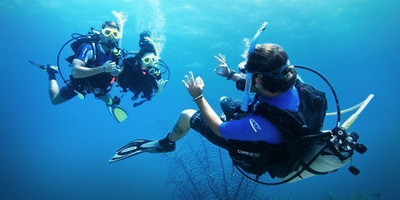How to Prepare for Unplanned Scenarios While Diving
Posted by Dive Professional: Will Taylor on on May 14th 2023
Scuba Diving, like any adventure, makes it essential to be prepared for various situations that may arise during a dive. Here are five different scenarios that can occur while scuba diving and how to prepare for them:
Equipment Failure:
Equipment failure can be a challenging situation to handle underwater. To prepare for this, divers should regularly maintain and service their gear. Before every dive, check the functionality of essential equipment such as the regulator, BCD (buoyancy control device), and dive computer. Familiarize yourself with the location of spare parts or alternate equipment, such as an alternate air source or a backup dive computer. Additionally, consider taking an equipment specialist course to learn basic troubleshooting techniques.
Lost Buddy:
Losing sight of your dive buddy can be disorienting and potentially dangerous. To prevent this situation, establish a buddy system before the dive and agree on hand signals and communication methods. Plan your dive with a pre-determined route and stick to it. Ensure that both you and your buddy are carrying a whistle or noisemaker to attract attention if needed. If you do get separated, follow the prearranged procedures, which may involve attempting to locate each other or returning to the surface to regroup.
Strong Currents:
Encountering strong currents can be physically demanding and may cause divers to drift away from the intended dive site. Prior to the dive, gather information about the current conditions from local authorities or experienced divers. If strong currents are anticipated, consider selecting a different dive site or rescheduling the dive. If you find yourself in a strong current during a dive, maintain a low profile by staying close to the bottom and using natural features for shelter. Signal your buddy and make a controlled ascent once you feel it is safe to do so.
Decompression Sickness:
Decompression sickness, also known as "the bends," can occur when a diver ascends too quickly, leading to the formation of nitrogen bubbles in the body. To minimize the risk, always plan your dives with safe ascent rates and adhere to decompression limits based on your dive tables or dive computer. Make sure to monitor your depth and time underwater closely during the dive. Additionally, consider taking a specialized course on dive planning and decompression procedures to enhance your knowledge and skills.
Marine Life Encounters:
While encountering marine life is often a highlight of scuba diving, it's crucial to be prepared for different scenarios involving marine creatures. Research the local marine life before diving and learn about any potential hazards or encounters you may face. Maintain a safe distance from animals, as some can be territorial or pose a threat if provoked. Familiarize yourself with signs of aggression or stress in marine creatures and adjust your behavior accordingly. If stung or bitten, follow the appropriate first aid protocols and seek medical attention if necessary.
In addition to these specific scenarios, general preparedness is key for any dive. Ensure you have a thorough understanding of dive theory and techniques by completing proper training and certification. Regularly practice and maintain your diving skills to build confidence and comfort underwater. Always dive within your limits and avoid risky behaviors such as pushing your depth or time limits. Finally, maintain a healthy level of physical fitness and ensure you are well-rested before each dive.
By being proactive and prepared for different situations, divers can enjoy a safe and rewarding underwater experience. Remember, scuba diving is an adventure, but safety should always be the top priority.
Check out our website for Scuba Gear.
Call us we have daily specials on all brands of gear, we might just be having a sale at theDiveCenter.
Feel free to contact us for expert Scuba advice and we are open every day.
1-888-728-2252

